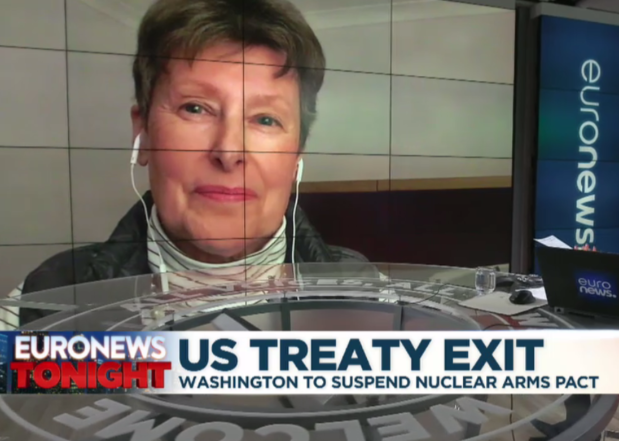On 2 February 2019, US Secretary of State Mike Pompeo officially announced that the United States would be suspending its obligations under the 1987 Intermediate-Range Nuclear Forces (INF) Treaty. This follows a 60-day period, during which the US government called for the Russian Federation to resolve allegations of non-compliance with the INF Treaty.The withdrawal could ostensibly take place as soon as 2 August 2019, six months after Secretary Pompeo's announcement.
VCDNP Senior Fellow Angela Kane has given several interviews on the INF Treaty, its goals and the possible consequences of a US withdrawal.
On 11 February 2019, Ms. Kane took part in a panel discussion on the future of the INF Treaty at the International Institute for Peace in Vienna (IPP). In addition to Ms. Kane the panel was also attended by the Permanent Representative of the Russian Federation to the International Organizations in Vienna Mikhail Ulyanov, the Deputy Permanent Representative of the U.S. Delegation to the Conference on Disarmament in Geneva Cynthia Plath and the University of Vienna's Heinz Gärtner. The discussion was moderated by IIP Director Stephanie Fenkart.
The IIP has compiled a written report of the event, as well as a video recording, which is available below. Ms. Kane's remarks begin at 38:30.
On 8 February 2019, Ms. Kane was interviewed by Agathe Zupan of the Austrian media broadcast station Österreichischer Rundfunk (ORF) in the Ö1 Europa-Journal programme. In the interview, conducted in German, Ms. Kane discussed the US withdrawal from the INF Treaty and the consequences for Europe. In the interview Ms. Kane highlighted that the intermediate-range and shorter-range missiles that were eliminated by the INF Treaty are exactly the range in which missiles launched from Russia could reach Europe. Though Ms. Kane noted that she thinks it is unlikely that Russia would target missiles at Europe, she stressed that Europe needs to consider its options moving forward. In the interview the trend of increased armament, the role of NATO and the future of arms control were discussed, particularly in the context of European security.
Listen to Ms. Kane's interview here, starting from 18:29.
Another such interview on 1 February 2019 was with Euronews and can be viewed below. In the interview, Ms. Kane expressed her views on the INF Treaty, including the prospect of adapting it to a multilateral format.
Ms. Kane also spoke with BBC's James Fernandez on 1 February to further discuss the potential impact of the US' withdrawal.
"To my mind [a new treaty] would have been a good approach, to say 'let's look at this treaty, let's look whether it's fit for purpose.' There have been over the years a number of comments that maybe it should be multilateralized or internationalized, meaning that other countries like China would be able to adhere to that treaty, but, on the other hand, there's no incentive. Why would they join an existing treaty, that was agreed between the United States and Russia? I think a new negotiation, a new multilateral negotiation, to address this issue would have been extremely helpful."
Listen to Ms. Kane's full interview here, beginning at 2:58 (also available on the BBC Newshour's website).



